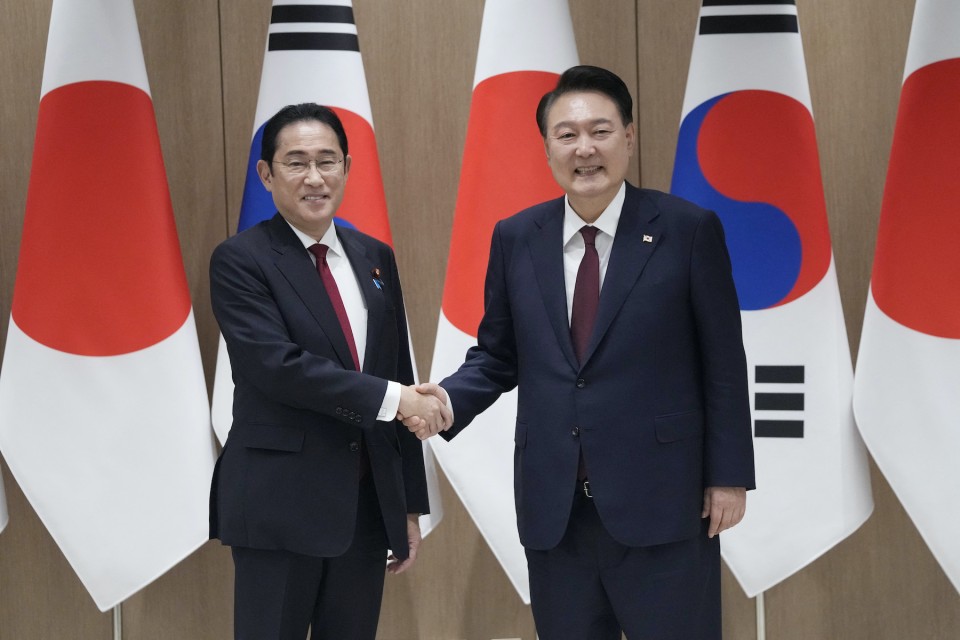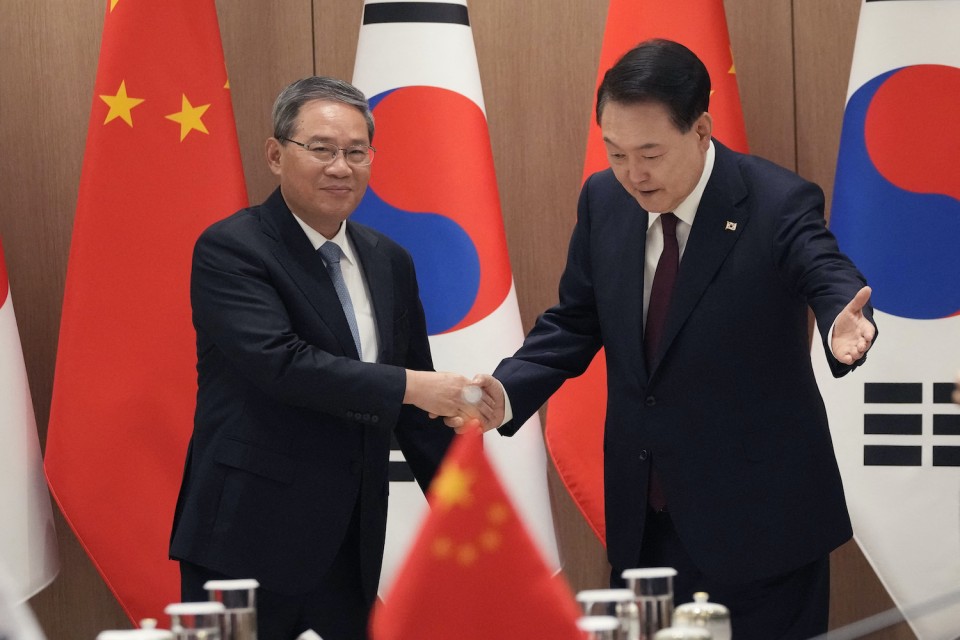
SEOUL, May 26, 2024 (AFP) – The premiers of China and Japan arrived in Seoul Sunday for their first trilateral summit in five years, which is expected to focus on economic issues rather than sensitive geopolitics.
There are low expectations of any major announcements or breakthroughs at the trilateral meeting Monday, but the leaders have expressed hopes it could help revitalise three-way diplomacy and ease regional tensions.
On Sunday afternoon, South Korean President Yoon Suk Yeol met Chinese Premier Li Qiang, who is making his first visit to South Korea since taking office in March 2023.
“China and South Korea face significant common challenges of the international affairs,” Yoon said, pointing to the wars in Ukraine and Gaza as sources of increased uncertainty in the global economy.
But with decades of solid ties behind them, he said he hoped the two countries “will continue to strengthen our cooperation amid today’s complex global crisis.”
Li said Beijing wanted to work with Seoul to become “a good neighbour worthy of trust on a mutual basis.”

The three leaders will hold a trilateral meeting on Monday, the first such encounter since 2019, partly due to the pandemic but also to long-strained ties between South Korea and Japan.
Yoon, who took office in 2022, has sought to bury the historical hatchet with former colonial power Japan in the face of rising threats from nuclear-armed North Korea.
Yoon met Kishida later Sunday, and said the two country’s trust and exchanges had “dramatically increased over the past year”, pointing to booming tourism, with millions of Koreans flocking to visit Japan, and vice versa.
He said he hoped to see a “historic turning point” and a further deepening of ties to mark 60 years in 2025 since a post-war deal normalised relations between Tokyo and Seoul.
Kishida said it was crucial that Seoul and Tokyo moved to step up cooperation “to better prepare for global issues while maintaining a free and open Indo-Pacific.”
Experts have warned that due to the three countries’ starkly divergent positions on key issues including Pyongyang’s nuclear threats and growing ties with Russia, it will be hard for them to form a consensus.
But South Korea and Japan, which are key regional security allies of China’s arch-rival the United States, are looking to improve trade and ease tensions with Beijing, experts say.
– No North Korea consensus –
Despite North Korea conducting ever-more advanced weapons tests and China staging military drills around Taiwan, experts expect the summit to ignore security issues and seek common ground for easy diplomatic wins.
China is North Korea’s largest trading partner and a key diplomatic ally, and it has previously resisted condemning Pyongyang for its weapons tests, instead criticising joint US-South Korea drills.
Pyongyang on Sunday slammed what it claimed were “wartime” level spy planes and boat missions by Seoul and Washington, threatening to take “immediate action” if its sovereignty was breached.
An official from Seoul’s presidential office said North Korea-related issues “are difficult to resolve cleanly and quickly in a short time”, so the summit will focus more on economic cooperation.
One area where Seoul and Tokyo may find themselves at odds is a business dispute over ownership of the popular messaging app LINE, developed by South Korea’s Naver and which is now under pressure from Tokyo to sell its controlling share in Japan.
Japanese broadcaster NHK said Kishida is also likely to press Li about China’s suspension of Japanese seafood imports. China stopped accepting Japanese fish shipments last year when Tokyo began releasing wastewater from the crippled Fukushima nuclear plant.
Leif-Eric Easley, a professor at Ewha University in Seoul told AFP the summit would involve “shallower cooperation” than the level of foreign policy alignment between Tokyo, Seoul and Washington.
Even so, it could “make incremental progress across many functional issues among Northeast Asian neighbours,” he said.
“That China is finally re-engaging in such trilateral coordination is good news for a rules-based regional order,” he added.
“However, Yoon and Kishida should not allow Beijing to hold trilateral cooperation hostage for silence over Taiwan, the South China Sea, human rights, and unfair trade practices.”







